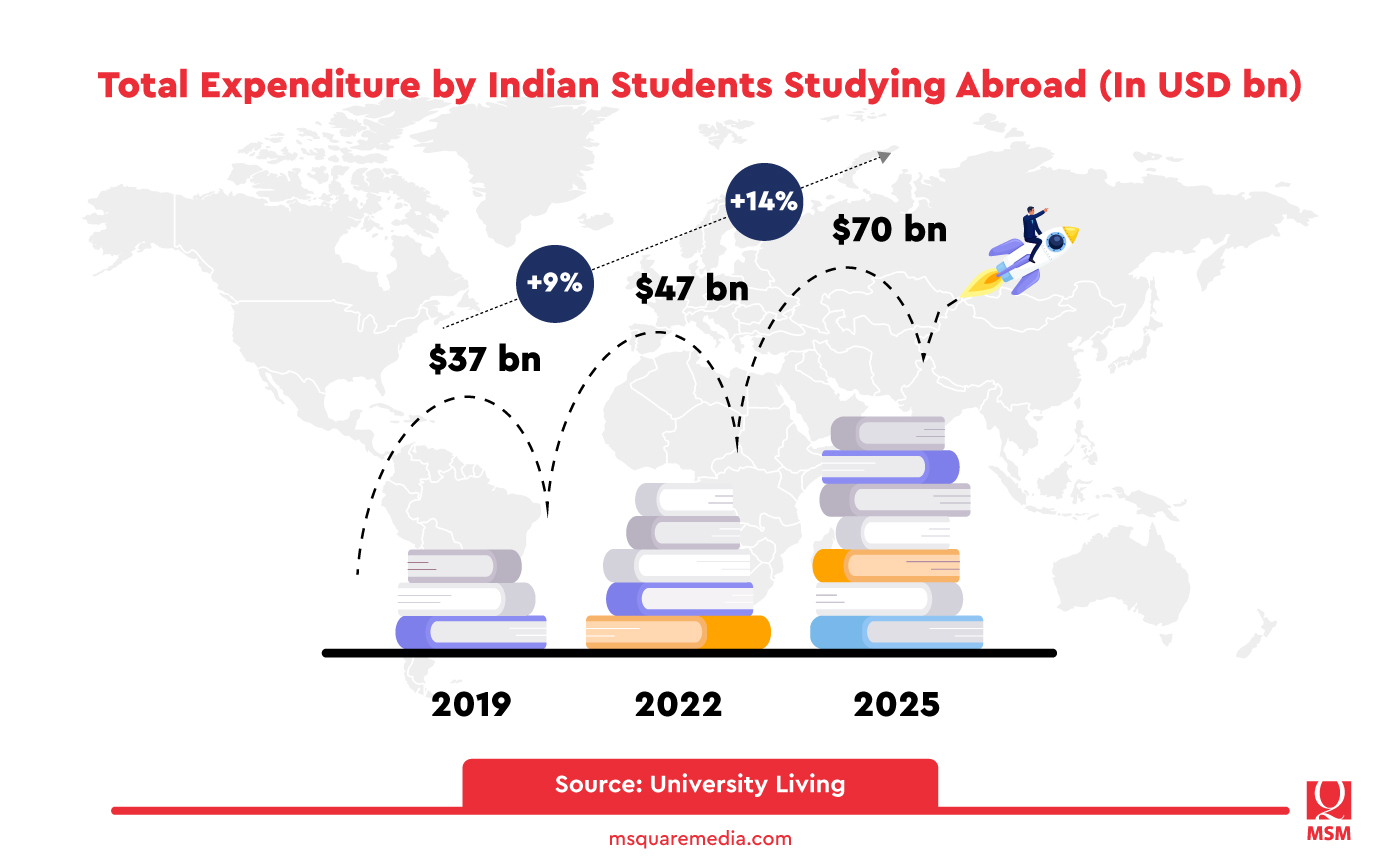Key Takeaways
- Projections suggest that if the current growth rate of 15% endures, a staggering 2 million Indian students are expected to be pursuing education abroad by 2025.
- According to the study, projections indicate that expenditure on international education could reach an impressive 70 billion USD by 2025.
- Creating an additional infrastructure capacity of about 25 million seats over the next decade meets ambitious Gross Enrolment Ratio (GER) targets. This will entail the establishment of thousands of new educational institutions.
The metamorphosis in Indian students’ pursuit of international education marks a significant transformation. Despite reports that India is the largest source market for international students, the Indian Student Mobility Report 2023 by University Living confirms this trend: a sharp rise in Indian students choosing international education due to a desire for diverse experiences and top-notch learning environments.
Outbound Mobility and Expenditure Trends

According to University Living’s Indian Student Mobility Report 2023, the past decade witnessed a significant transformation in the landscape of education for Indian students. In 2019, more than a million Indian students pursued education abroad, increasing to nearly 1.5 million by 2022, marking a 7% surge.
Based on a 15% growth rate, projections suggest that by 2025, the number of Indian students studying abroad could soar to 2 million.
Simultaneously, financial investment in international education has seen remarkable growth. In 2019, Indian students collectively spent an estimated 37 billion USD on education abroad, which escalated to an estimated 47 billion USD by 2022, encompassing tuition fees, housing, and other living costs.
Projections based on a 14% growth rate indicate potential spending of 70 billion USD by 2025, underscoring the increasing eagerness of Indian families to invest in global education.
The Big 4
Among the preferred study destinations for Indian students are the United States, Canada, Australia, and the United Kingdom. These countries serve as educational hubs that not only foster academic excellence but also benefit economically from the diverse talents and aspirations of Indian students.
- In the US, 240,000 Indian students made a $12.48-billion contribution to the economy through total expenditure. This spending comprised US $7.2 billion for academic fees, US $2.9 billion for accommodation, and US $2.4 billion for other living expenses.
- In Canada, around 300,000 Indian students make a substantial economic impact, spending an estimated total of US $11.7 billion. This spending covers US $6 billion for academic fees, US $3 billion for accommodation, and US $2.7 billion for other living necessities, enriching both the education system and the nation’s economy.
- In Australia, approximately 76,500 Indian students contributed an estimated total of US $3.9 billion, with US $1.68 billion for academic fees, US $0.99 billion for accommodation, and US $1.22 billion for other living expenses.
- In the United Kingdom, 132,000 Indian students make an estimated US $5.9 billion contribution to the economy. This includes US $3.4 billion on academic fees, US $1.3 billion for accommodation, and US $1.2 billion for other living expenses.
These figures highlight how Indian students’ global economic impact underscores the symbiotic relationship between nations and the influential role of international education.
Challenges and Proposed Solutions
Looking at the current outbound mobility, the Indian higher education sector is presented with a remarkable opportunity for growth. While there is a notable disparity between the quantity of educational institutions and the desired quality of education, this discrepancy acts as a catalyst for positive change. Recognizing this need for improvement offers a unique opportunity to enhance the educational landscape.
The absence of Indian institutes in the top 200 global university rankings signals the potential for enhancing education nationwide. Expanding on this momentum requires the creation of an additional infrastructure capacity of about 25 million seats over the next decade, aligning with ambitious Gross Enrolment Ratio (GER) targets.
Role of International Education Leaders
Leaders in international education play a pivotal role in addressing these challenges. Collaboration between institutions, quality assurance, and capacity-building initiatives are imperative to ensure globally competitive education.
By aligning education with industry demands through global partnerships for skill development, leaders enhance students’ employability on the global platform. Establishing counseling and mentorship programs adds a supportive layer, addressing the holistic needs of students during their educational journeys abroad.
Another pressing issue that may arise from the current trend of international students studying abroad is housing. While we may have little control over this, international education leaders and service providers need to devise detailed plans to help students secure university accommodations. Implementing strategic measures empowers these leaders to guide the global generation, transforming their educational pursuits into an enriching experience that prepares them for success in an interconnected world.
Moving Forward
As we near the end of 2023, the future of international education appears promising. The current statistics serve as a testament to the symbiotic relationship between nations and the transformative impact of education. As Indian students pursue their educational aspirations on a global platform, the benefits are reciprocal, fostering economic growth, cultural exchange, and a shared vision for a more interconnected future. It’s evident in the global education landscape that the contributions of Indian students are making a lasting impact on the economies and societies of their host countries. (RAGHWA GOPAL)

RAGHWA GOPAL
MSM CEO
Raghwa Gopal is a serial entrepreneur, academic, and software engineer by profession. Drawing from extensive business experience, Raghwa joined MSM from British Columbia’s Innovate BC, serving as president and CEO and helping companies start and scale to fuel technology development, commercialization, and adoption. As Accelerate Okanagan’s (AO) former CEO, he was a driving force in development of the tech sector, with a CA$1.6-billion economic contribution.
Raghwa studied at New Zealand’s Central Institute of Technology, Australia’s Collier MacMillan School, and the University of the South Pacific. He has strong ties to higher education as a former lecturer of business at UBC Okanagan, computer science at the School of Arts and Sciences, and entrepreneur-in-residence at Okanagan College School of Business.
His board memberships span across multiple organizations, such as the University of British Columbia, the India Canada Innovation Council, the Women’s Enterprise Centre, and the Province of British Columbia’s Emerging Economy Task Force.
Sources:
- 2023. Beyond Beds and Boundaries: Indian Student Mobility Report 2023. University Living. Retrieved from https://www.universityliving.com/blog/industry-reports/indian-student-mobility-report-2023

